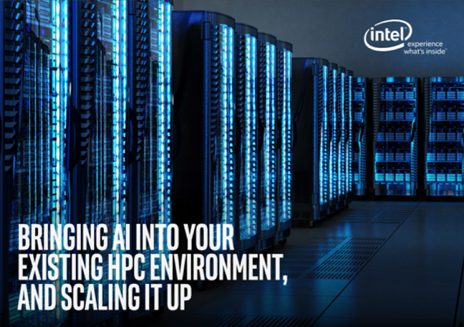This guest post from Intel highlights key points from its new eGuide that focuses on embracing AI in your HPC environment.

The advent of AI is creating new possibilities to tackle increasingly complex research beyond the traditional HPC analytics, modeling, and simulation workloads. Neural networks, machine learning and deep learning address challenges which existed in the realm of science fiction a decade ago. Because AI evaluates data using sets of algorithms or “theories,” AI can use inference to overcome data gaps. As a result, the insights from data gained by scientists exceed those of traditional instruction sets.
In some cases, AI combines its prowess with modeling, simulation and big data analysis. These “hybrid” workloads take the best of both worlds, creating a multi-step process. While hybrid scenarios can prove extremely effective for complex computing challenges, they also place a heavy burden on an HPC system. In these cases, a multi-node, balanced HPC system – one capable of handling both types of workflows – must be optimized for discoveries which are increasingly automated.
To meet future demands of users and the compute systems to support them, here are a few practical considerations for HPC professionals from a brand new Intel eGuide: Bringing AI Into Your Existing HPC Environment, and Scaling It Up.
First, a scalable HPC system is more than the sum of its parts. A flexible system emerges from a holistic view of user needs now and into the future. The combination of software, hardware, and IT skills converge to create a balanced HPC system and offer the support and tools for scientific endeavors. HPC pros supporting academic environments face a unique challenge in this regard. Individual researchers crossing many different scientific disciplines require an HPC system with the substantial flexibility to facilitate a diverse array of workloads. In short, an HPC system must fulfill immediate needs of end users and have the underlying architecture to scale over time as user needs — and AI-based workloads — demand it.
A holistic HPC system must also take into account an adaptable development environment. From an application point of view, end-user experience represents a principal consideration. For research activities like simulation, visualization, and AI alike, applications optimized for these tasks represent a key ingredient for success. In emerging research fields involving unique workloads, ready-made applications may require coding. In these cases, organizations may need to identify developers with the needed skill sets to modify existing applications or create them from scratch. HPC pros can benefit from the global HPC community which offers performance libraries for all sizes of HPC systems, and standards-based software environments.
As new components of an HPC system are acquired, a substantial benefit derives from a validation process before production rollout.
Most organizations tapping HPC prowess have made substantial investments in physical infrastructure. Wherever possible, maximize those investments for the greatest ROI before additional investments are made. However, if a current system’s prowess creates bottlenecks when running complex workloads, upgrades may be beneficial. In these cases, a staged approach – mapping future budget against needed hardware investments – will ensure existing infrastructure evolves in parallel with user requirements.
As new components of an HPC system are acquired, a substantial benefit derives from a validation process before production rollout. Through the testing process, HPC pros can ascertain the system’s ability to handle challenging hybrid workloads, derive meaningful insights from data, and identify where bottlenecks may remain. If the updated system cannot support needed requirements for any reason, the team can regroup to determine necessary modifications for existing infrastructure, or consider alternate solutions if necessary.
HPC pros face many challenges as we move into a new decade of discovery driven by increasingly common AI-based workflows. Thanks to the efforts of HPC experts and those they support, we face a bright and exciting future of scientific understanding and innovation to benefit humanity.
Learn more
To find out more about the implementation of HPC technologies to support AI workloads check out the Intel eGuide: Bringing AI Into Your Existing HPC Environment, and Scaling It Up.



